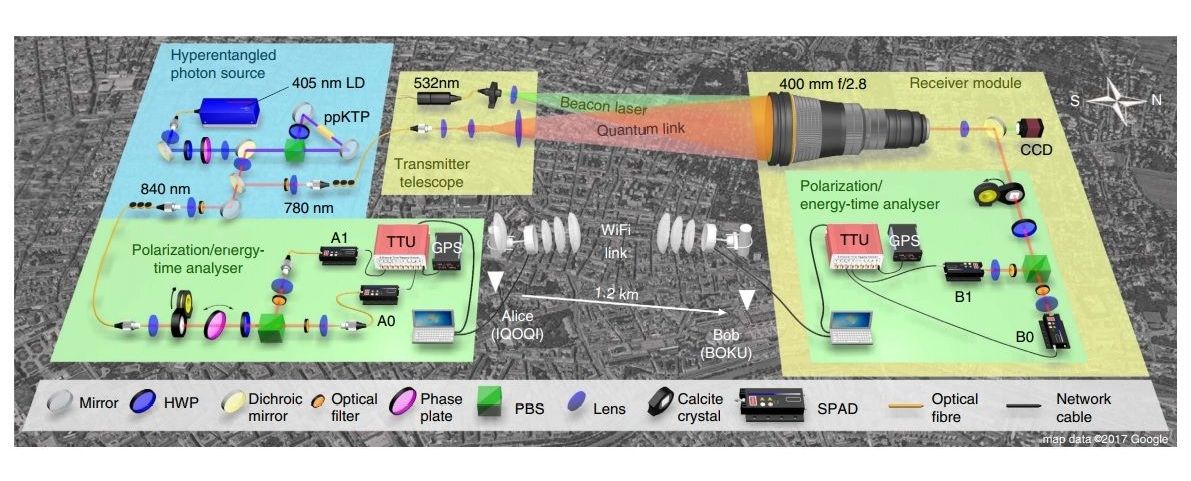Page 10158
Aug 24, 2017
Hyperentanglement across roof tops paves the way toward a global quantum Internet
Posted by Sean Cusack in categories: internet, quantum physics, satellites
(Phys.org)—For the first time, physicists have demonstrated that hyperentangled photons can be transmitted in free space, which they showed by sending many thousands of these photons between the rooftops of two buildings in Vienna. Hyperentanglement means that the photons are simultaneously entangled in at least two different properties—in this experiment, the researchers combined two two-dimensionally entangled properties to achieve four-dimensional hyperentanglement.
By showing that hyperentanglement transmission is feasible in the real world and not only in the lab, the physicists expect that the demonstration could one day be scaled up to establish a highly secure quantum Internet that uses satellites to quickly and securely transmit quantum information across the globe.
The physicists, led by Rupert Ursin at the Institute for Quantum Optics and Quantum Information (IQOQI) at the Austrian Academy of Sciences in Vienna, have published a paper on the distribution of hyperentanglement via atmospheric free-space links in a recent issue of Nature Communications.
Aug 24, 2017
Government Warns North Korean Cyber Attacks Continue
Posted by John Gallagher in categories: cybercrime/malcode, finance, government
The Department of Homeland Security and FBI issued a new warning on Wednesday that North Korean government hackers are continuing to target critical U.S. infrastructure for cyber attacks.
A technical report by DHS’ National Cyber Awareness System reveals details of the tools and cyber methods being used by North Korean government hackers.
The alert said the North Korean government is using the cyber tools to “target the media, aerospace, financial, and critical infrastructure sectors in the United States and globally.”
Continue reading “Government Warns North Korean Cyber Attacks Continue” »
Aug 24, 2017
Study: Eye Test Could Predict Alzheimer’s Disease Years In Advance
Posted by John Gallagher in categories: biotech/medical, neuroscience
An eye test could predict whether someone could have Alzheimer’s disease years in advance, according to a recent study.
Researchers from Cedars-Sinai and company NeuroVision Imaging found the disease affects the retina, which is the back of the eye, in a similar way to how it impacts the brain. Through this discovery, researchers conducted a noninvasive eye scan in an effort to detect key signs of Alzheimer’s before patients began experiencing symptoms of the disease.
The study, which was published Tuesday in JCI Insight, said a high definition eye scan was able to see the plaque in the retina, which correlated with the amount in the brain. The plaque is a buildup of toxic proteins called amyloid-beta deposits, which are key signs of Alzheimer’s. Build up in the brain may occur as early as two decades before people begin to experience signs of the disease.
Continue reading “Study: Eye Test Could Predict Alzheimer’s Disease Years In Advance” »
Aug 24, 2017
Will Gene Editing Allow Us to Rid the World of Diseases?
Posted by John Gallagher in categories: bioengineering, biotech/medical, genetics, neuroscience
Scientists recently used a gene-editing tool to fix a mutation in a human embryo. Around the world, researchers are chasing cures for other genetic diseases.
Now that the gene-editing genie is out of the bottle, what would you wish for first?
Babies with “perfect” eyes, over-the-top intelligence, and a touch of movie star charisma?
Continue reading “Will Gene Editing Allow Us to Rid the World of Diseases?” »
Aug 24, 2017
Experts warn of ‘third revolution in warfare’
Posted by John Gallagher in category: military
A letter to the UN warns the world is getting closer to a dangerous “third revolution in warfare”.
Aug 24, 2017
Private firm puts $500K bounty on Signal, WhatsApp zero-day vulnerabilities
Posted by John Gallagher in categories: business, security
Zero-day vulnerabilities targeting popular secure messenger applications, like Signal, Telegram and WhatsApp, can fetch payments of up to $500,000 from Zerodium, a buyer and seller of zero-day research, based on a newly released list of available awards offered by the U.S. firm.
The market for zero-day vulnerabilities — an undisclosed software security hole that can be exploited by hackers — is notoriously rich and murky. Traders tend to operate away from public scrutiny for a number of reasons that make it difficult to learn about the market.
Although Zerodium isn’t known for the transparency of its business, the company’s listings for vulnerabilities provides a window into the supply and demand behind the vulnerability resale industry.
Continue reading “Private firm puts $500K bounty on Signal, WhatsApp zero-day vulnerabilities” »
Aug 24, 2017
People Versus Machines: The Impact of Minimum Wages on Automatable Jobs
Posted by Mark Larkento in categories: employment, robotics/AI
Automation, unemployment, & low wage workers
We study the effect of minimum wage increases on employment in automatable jobs – jobs in which employers may find it easier to substitute machines for people – focusing on low-skilled workers from whom such substitution may be spurred by minimum wage increases. Based on CPS data from 1980–2015, we find that increasing the minimum wage decreases significantly the share of automatable employment held by low-skilled workers, and increases the likelihood that low-skilled workers in automatable jobs become unemployed. The average effects mask significant heterogeneity by industry and demographic group, including substantive adverse effects for older, low-skilled workers in manufacturing. The findings imply that groups often ignored in the minimum wage literature are in fact quite vulnerable to employment changes and job loss because of automation following a minimum wage increase.
You may purchase this paper on-line in.pdf format from SSRN.com ($5) for electronic delivery.
Aug 24, 2017
Futurist Gray Scott: We are Part of a Technological Cosmos
Posted by Johnny Boston in categories: biological, bionic, electronics, evolution, futurism, human trajectories, innovation, media & arts, philosophy, robotics/AI

How will our relationship to technology evolve in the future? Will we regard it as something apart from ourselves, part of ourselves, or as a new area of evolution? In this new video from the Galactic Public Archives, Futurist Gray Scott explains that we are a part of a technological cosmos. Do you agree with Scott that technology is built into the universe, waiting to be discovered?
Follow us on social media:
Twitter / Facebook / Instagram
Continue reading “Futurist Gray Scott: We are Part of a Technological Cosmos” »
Tags: cosmos, future, futurist, futuristic, Geometry, GPA, gray scott, math, philosopher, philosophy, science, tech, technological, technology, transhumanism, video, writer, writing

















